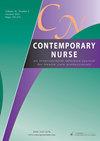Cultural Safety: Beyond the rhetoric
IF 2.1
4区 医学
Q3 NURSING
引用次数: 2
Abstract
We acknowledge the sovereignty of Indigenous peoples across the Earth as the traditional custodians of Country, and their timeless and embodied relationships with cultures, communities, lands, waters, and sky. We pay our respects to Elders, past and present, particularly those who led the way, allowing us to realise our own calling to be healers. In this second iteration of a two-part special issue on Cultural Safety, we the Australian and Aotearoa New Zealand members of the guest editorial team would like to take this opportunity to draw attention to two contemporary examples of institutional racism in nursing and midwifery care in our respective countries. Despite decades of Indigenous activism, antiracism educational initiatives, and regulatory reforms, racism continues to be an endemic oppressive element in nursing and midwifery, and health systems. Despite Indigenous knowledges, anti-racism and Cultural Safety mandates being embedded in our professional standards and codes of conduct (Nursing and Midwifery Board of Australia, 2018; Nursing Council of New Zealand, 2011), we are forced to continue to interrogate the ongoing practice of culturally unsafe nursing and midwifery care. As a guest editorial team, we are also members of our Indigenous communities. We share the lived experience of family and community, of marginalisation, intergenerational trauma, and the profound bereavement of deaths from preventable health conditions. Statistics tell a narrative of deficit, of inequitable determinants of health and disproportion in our Indigenous health status compared to the mainstream population. As Indigenous nurses and midwives, we are also members of an international body of health care professionals where we have seen and experienced racism in our respective national health care systems. We bring witness to its complicit role in enacting direct and indirect trauma upon Indigenous peoples and their communities from culturally unsafe, and negligent nursing and midwifery practices. The examples of unsafe practices we share in this paper are to highlight our argument that systemic racism continues to go unchecked and reforms at leadership and policy levels are not addressing the issue with expedience.文化安全:超越修辞
我们承认,世界各地的土著人民是国家的传统守护者,拥有主权,他们与文化、社区、土地、水域和天空有着永恒和具体的关系。我们向过去和现在的长者致敬,特别是那些引领道路的人,他们让我们意识到自己的使命是成为治疗者。在本期《文化安全》特刊的第二期中,我们澳大利亚和新西兰的特约编辑团队成员想借此机会提请大家注意我们各自国家护理和助产护理中存在的两个当代制度性种族主义例子。尽管数十年来原住民积极行动、反种族主义教育倡议和监管改革,种族主义仍然是护理、助产和卫生系统中普遍存在的压迫因素。尽管土著知识、反种族主义和文化安全任务已被纳入我们的专业标准和行为准则(澳大利亚护理和助产委员会,2018年;新西兰护理委员会,2011年),我们被迫继续审问文化上不安全的护理和助产护理的持续实践。作为客座编辑团队,我们也是土著社区的成员。我们共同经历了家庭和社区、边缘化、代际创伤以及因可预防的健康状况而死亡的深刻损失。统计数据表明,与主流人口相比,我们土著居民的健康状况存在缺陷,健康决定因素不公平,比例失调。作为土著护士和助产士,我们也是国际卫生保健专业人员机构的成员,我们在各自的国家卫生保健系统中看到并经历了种族主义。我们目睹了它在文化上不安全和疏忽的护理和助产做法对土著人民及其社区造成直接和间接创伤方面的同谋作用。我们在本文中分享的不安全做法的例子是为了强调我们的观点,即系统性种族主义继续不受控制,领导层和政策层面的改革并没有权宜之计解决这个问题。
本文章由计算机程序翻译,如有差异,请以英文原文为准。
求助全文
约1分钟内获得全文
求助全文
来源期刊

Contemporary Nurse
医学-护理
CiteScore
2.00
自引率
6.20%
发文量
38
审稿时长
6-12 weeks
期刊介绍:
Contemporary Nurse is an international peer-reviewed journal designed to increase nursing skills, knowledge and communication, assist in professional development and to enhance educational standards by publishing stimulating, informative and useful articles on a range of issues influencing professional nursing research, teaching and practice.
Contemporary Nurse is a forum for nursing educators, researchers and professionals who require high-quality, peer-reviewed research on emerging research fronts, perspectives and protocols, community and family health, cross-cultural research, recruitment, retention, education, training and practitioner perspectives.
Contemporary Nurse publishes original research articles, reviews and discussion papers.
 求助内容:
求助内容: 应助结果提醒方式:
应助结果提醒方式:


